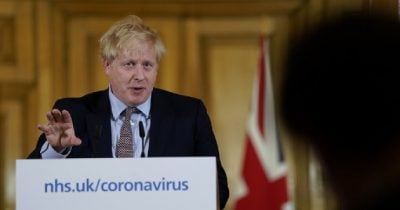UK’s Military Spending Boost Will Make the World More Dangerous
Boris Johnson announces billions for the defence industry, peanuts for climate action and nothing to tackle child poverty, writes Andrew Smith.

‘I have decided that the era of cutting our defence budget must end, and it ends now.’
These were the words of the Prime Minister, Boris Johnson, when he the biggest increase to the UK’s military budget since the Cold War. His shopping list includes lasers, a ‘hackers HQ’ and all sorts of conventional weapons.
It is hard to believe that this is the same Prime Minister who only a matter of days ago was arguing that his government could not afford to provide meals for hungry school students during the October break. But this decision does not just tell us about the domestic priorities of the PM, it also tells us a lot about how ‘Global Britain’ will act on the world stage.
With the UK in the final days of Brexit negotiations, we are starting to see the redrawing of its foreign policy. It is likely to see an even more inward-looking approach to world affairs. Earlier this week the government refused to rule out cuts to the overseas aid budget, with Downing Street sources briefing that it could be reduced from 0.7 per cent of spending to 0.5 per cent – a cut of around one third to a commitment that is enshrined in law.
In comparison, the proposed increase in military spending, of £16 ($21) billion over a four-year period, would be on top of what is already one of the highest military budgets in the world. Contrary to the image we are often given of a depleted military that is supposedly dying on its knees, data from the International Institute for Strategic Studies shows that, with £55 ($72) billion at its disposal prior to the announcement, the UK already has the sixth–highest military budget in the world.
The problem is not just the scale of military spending. It is also what it is used for. For far too long, UK security policy has been focused on military solutions, foreign wars of aggression and hypocritical and dangerous partnerships with human rights abusing regimes. These policies have had a devastating impact around the world, while doing nothing to keep us safe from many of the biggest threats, including pandemics, inequality and climate change.
With the scale of the Covid-19 crisis becoming apparent, it is clear that the government has a big job ahead in terms of rebuilding the economy after the pandemic, and, with so many sectors of the economy facing uncertain futures, it is important that it is done right.
We are told that this military funding is a necessary part of that rebuilding, and that it will be used to secure thousands of jobs. However, even if we were to strip away the dire political consequences and look at military spending as nothing more than a job creation scheme, then it is totally ineffective. There are more and better jobs that can be created through investing in far more positive and sustainable areas of engineering, such as renewable energy.
Research from Campaign Against Arms Trade (CAAT) shows that investment in offshore wind and marine energy could produce more jobs than the entire arms industry, providing alternative high-skilled employment for arms trade workers. Jobs in an industry which is growing rather than declining, and which would contribute to building a safer, rather than a more dangerous, world.
Making a transition from arms to renewables and other areas of engineering is a long-term process, but that is no reason not to do it. There is no doubt that such a change would require major support and political will from the government, but if these changes are made then it can help us to prepare for a different future based on different political and economic choices.
However, when push has come to shove the government has totally failed to face up to the challenge of climate change. This week Johnson also announced his ‘green industrial revolution.’ Most of these steps did not go far enough to meet the scale of the climate emergency we are facing, and nor did the funding. With ($4 billion) provided in additional funding, it is less than a quarter of what has been pledged for the military.
This pandemic has underlined many things: how our security is interdependent on that of our neighbours around the world; that the least well-paid with the least working rights are many of the same people that keep our societies running, and that people of colour have been hit hardest by Covid-19. That is why the government must maintain its aid commitments, while investing in the services and workers that we all rely on.
The decisions made by the government will have consequences for years to come. In a post-covid world, access to healthcare facilities, a living wage, environmental sustainability, and other essential services should be seen as a key part of a wider national security strategy. None of these causes are advanced by the ever-greater proliferation of bombs, missiles, and fighter jets. Security does not come from throwing money at the military, it comes from building more equal societies and better services.
*
Note to readers: please click the share buttons above or below. Forward this article to your email lists. Crosspost on your blog site, internet forums. etc.
Andrew Smith is a spokesperson for Campaign Against Arms Trade (CAAT).
Featured image: Prime Minister Boris Johnson during a press conference on 16 March, with Chief Medical Officer Prof Chris Witty and Chief Scientific Adviser Sir Patrick Vallance. Picture by Andrew Parsons

